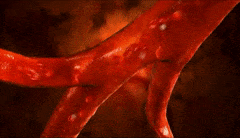Types of blood
Hello my
dear invisible friends.
Have you
ever wondered why it is so important to know our blood type?
If you have
not been asked, very bad friends, very bad.
If you
asked it but did not seek the answer, this server has come to answer it.
When
doctors tell you that "your blood group" is, for example, A +, they
are talking about the classification of your blood. Where:
• A,
corresponds to the type of antigen * that contains your blood
• +,
corresponds to the Rh * factor, present or not present in your blood.
The
classification of the blood is attributed to Karl Landsteiner, who in fact won
a Nobel for this, because in 1901 he discovered the first way to classify blood,
the ABO system.
ABO SYSTEM
Now, when
we talk about antigen, we talk about a substance that triggers antibodies, that
is, a substance that attacks whatever strange thing it gets. Therefore, it is
important to know what your blood type is, because:
• If your
blood type is A: it means that red blood cells contain antigen A, so you form
antibodies against antigen B.
• If your
blood type is B: it means that the red blood cells contain B antigen, thus
forming antibody against antigens A.
• If your
blood type is O: it means that your red blood cells have no antigen, therefore
you have antibodies against A and B because you do not recognize them.
• If your
blood type is AB: it means that your red blood cells contain antigens A and B
antigens, therefore you do not have antibodies because A and B are known.
Paying
close attention to the above, we know that:
• A: can
receive blood from A and O
• B: can
receive B and O blood
• O: you
can receive blood only from O because A and B are strangers to it, but you can
give blood to others (universal donor)
• AB: you
can receive blood from everyone because you know everything, nothing is strange
but you can only give blood to AB (universal receiver)
It is
important to know that your blood type has been inherited from your parents, so
your blood type may or may not be theirs (Thanks Mendel)
Progenitor
O and Progenitor O = child O
Progenitor
O and Progenitor A = child O or A
Progenitor
O and Progenitor B = child O or B
Progenitor
O and Progenitor AB = child B or A
Progenitor
A and progenitor A = child O or A
Progenitor
A and Progenitor B = child O, A, B or AB
Progenitor
A and Progenitor AB = son A, B or AB
Progenitor
B and Progenitor B = child O or B
Progenitor
B and Progenitor AB = child A, B or AB
Progenitor
AB and Progenitor AB = son A, B or AB
FACTOR
RHESUS OR Rh
It is a
second system discovered by Dr Landsteiner, where Rh refers to a protein (or
antigen) found in red blood cells, so you have this protein (positive +) or you
do not have (negative -). For what a person that contains contains the Rh
antigen can receive blood of a person that contains them or of a person that
does not; But if a person does not contain Rh in their blood, they can only
receive blood from another person who does not contain it.
Now,
according to the Stanford University School of Medicine, the global percentages
of individuals for each blood type are:
O-positive:
37.4%
Or
negative: 6.6%
A positive:
35.7%
A negative:
6.3%
B-positive:
8.5%
B-negative:
1.5%
AB-positive:
3.4%
AB-negative:
0.6%
Being the
group AB the one of smaller percentage, or the strangest one.
It is said
that there are actually 30 blood groups but only the 8 groups we talked about
are more common.
It is very
important to know what our blood group is in case of an emergency.
It is also
very important to donate blood, we would be saving lives, helping people in
their moments of urgency, I hope you are encouraged to donate but it is
advisable to have control tests to know if they are healthy before donating.
I hope you
liked this post and I hope it has been very helpful.








Comentarios
Publicar un comentario